KANGO: Legal Framework, Business Operations, and Dispute Resolution
VerifiedAdded on 2020/10/23
|10
|2910
|482
Report
AI Summary
This report examines the legal framework and legal solutions relevant to the business operations of KANGO. It begins with an overview of the English legal system, including its principle sources such as Acts of Parliament, case laws, European Union Law, and the European Convention on Human Rights. The report then explains how legislation comes into force and identifies key legislation affecting KANGO's business, including company law, contract law, and employment law. A detailed explanation of employment law is provided, differentiating between employed and self-employed statuses, with a case study on Pimlico Plumbers v Smith. The report evaluates various business organization types available to KANGO, such as sole proprietorship, partnership, joint venture, and limited companies. Finally, it recommends legal solutions to resolve disputes, particularly focusing on alternative dispute resolution methods for a case scenario involving a dispute between KANGO and its IT department. The report aims to provide comprehensive legal advice and solutions to support KANGO's business expansion and operational efficiency.
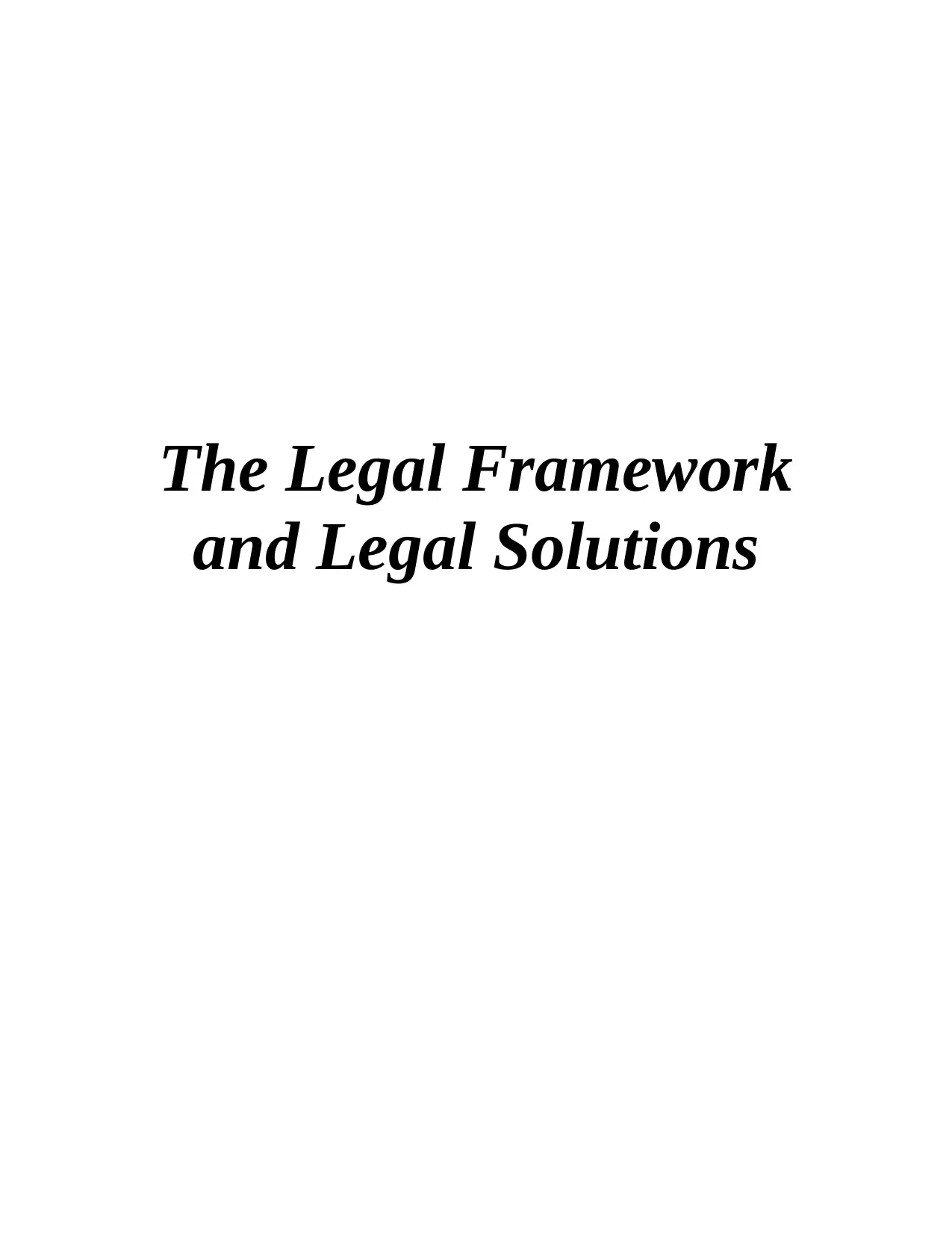
The Legal Framework
and Legal Solutions
and Legal Solutions
Paraphrase This Document
Need a fresh take? Get an instant paraphrase of this document with our AI Paraphraser
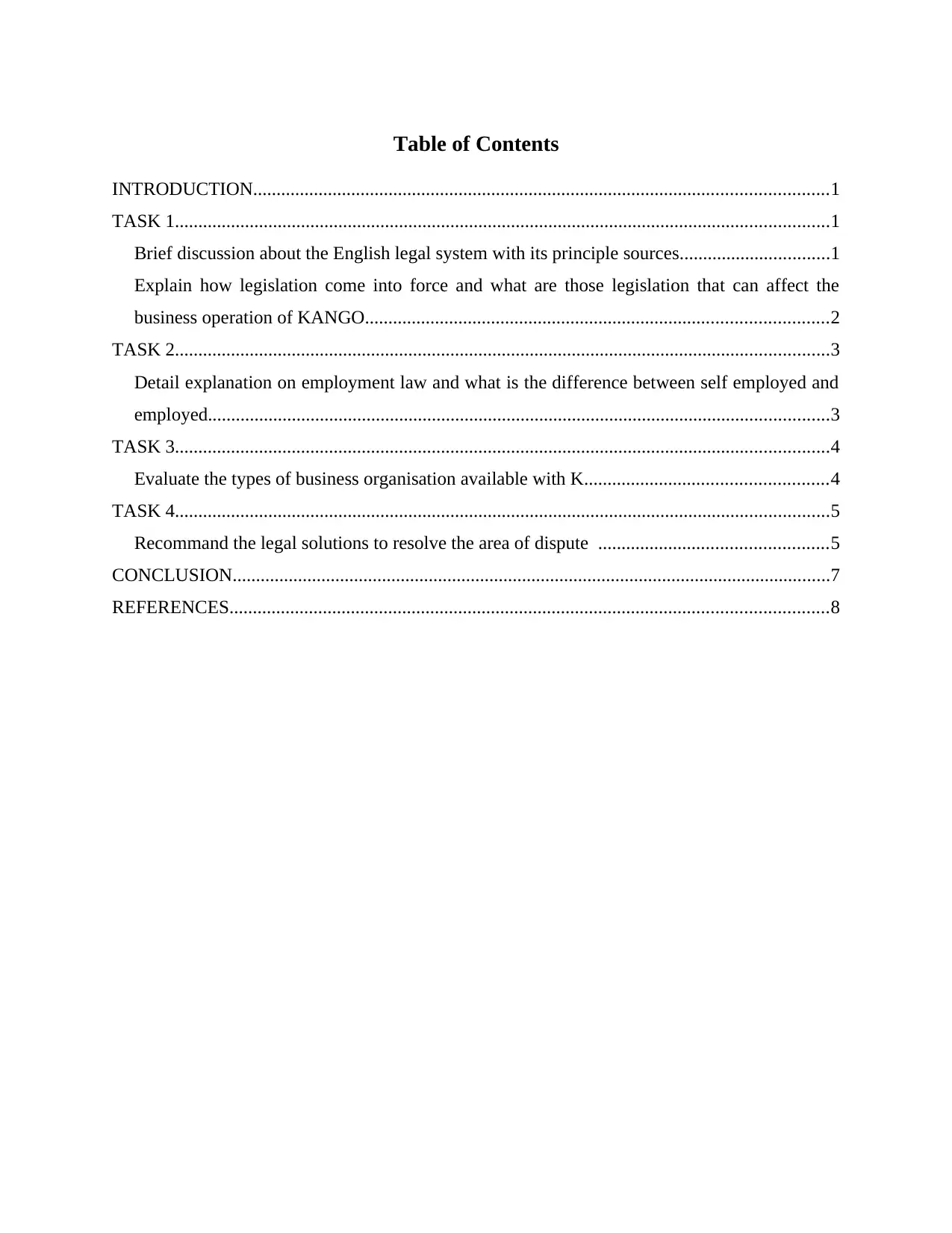
Table of Contents
INTRODUCTION...........................................................................................................................1
TASK 1............................................................................................................................................1
Brief discussion about the English legal system with its principle sources................................1
Explain how legislation come into force and what are those legislation that can affect the
business operation of KANGO...................................................................................................2
TASK 2............................................................................................................................................3
Detail explanation on employment law and what is the difference between self employed and
employed.....................................................................................................................................3
TASK 3............................................................................................................................................4
Evaluate the types of business organisation available with K....................................................4
TASK 4............................................................................................................................................5
Recommand the legal solutions to resolve the area of dispute .................................................5
CONCLUSION................................................................................................................................7
REFERENCES................................................................................................................................8
INTRODUCTION...........................................................................................................................1
TASK 1............................................................................................................................................1
Brief discussion about the English legal system with its principle sources................................1
Explain how legislation come into force and what are those legislation that can affect the
business operation of KANGO...................................................................................................2
TASK 2............................................................................................................................................3
Detail explanation on employment law and what is the difference between self employed and
employed.....................................................................................................................................3
TASK 3............................................................................................................................................4
Evaluate the types of business organisation available with K....................................................4
TASK 4............................................................................................................................................5
Recommand the legal solutions to resolve the area of dispute .................................................5
CONCLUSION................................................................................................................................7
REFERENCES................................................................................................................................8
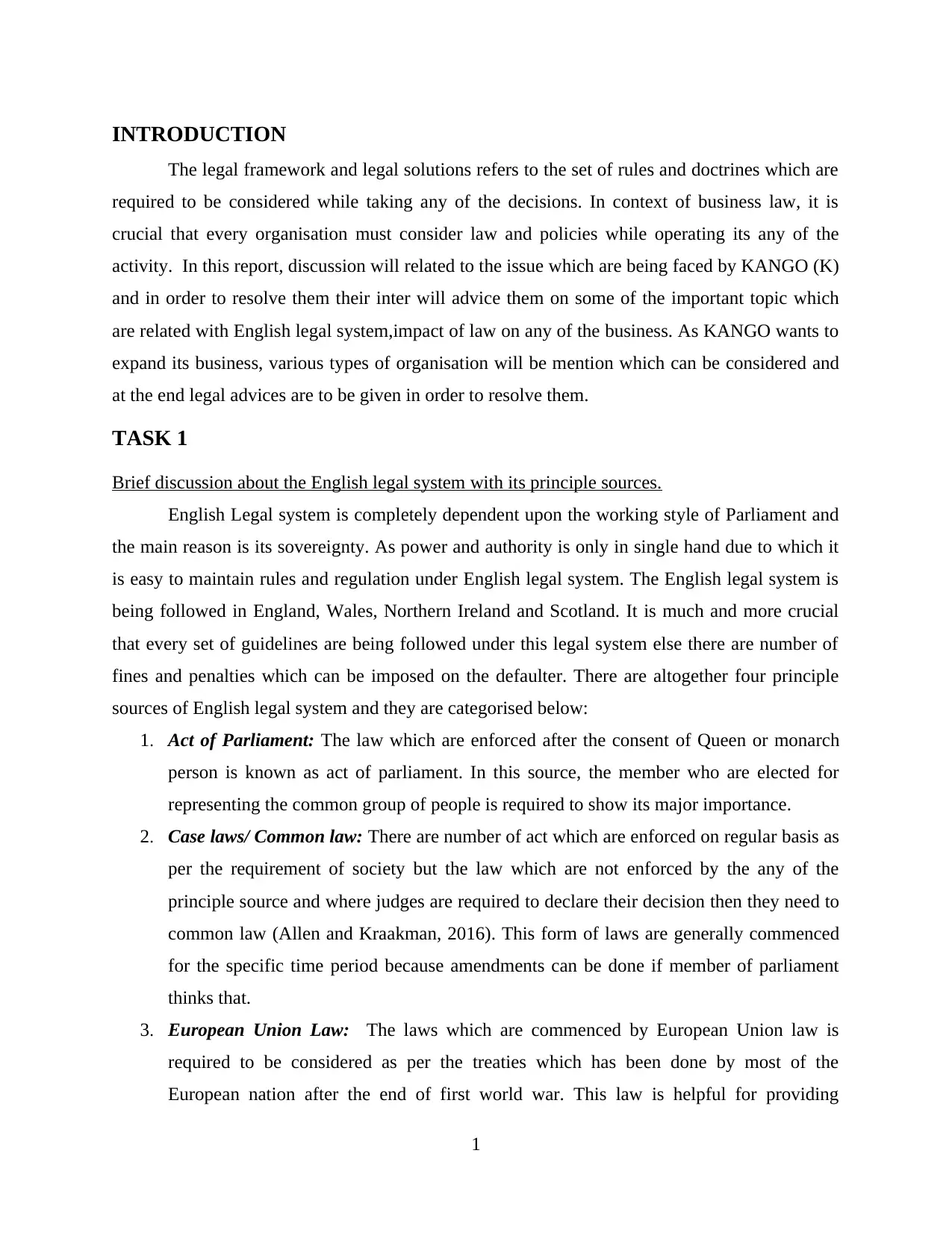
INTRODUCTION
The legal framework and legal solutions refers to the set of rules and doctrines which are
required to be considered while taking any of the decisions. In context of business law, it is
crucial that every organisation must consider law and policies while operating its any of the
activity. In this report, discussion will related to the issue which are being faced by KANGO (K)
and in order to resolve them their inter will advice them on some of the important topic which
are related with English legal system,impact of law on any of the business. As KANGO wants to
expand its business, various types of organisation will be mention which can be considered and
at the end legal advices are to be given in order to resolve them.
TASK 1
Brief discussion about the English legal system with its principle sources.
English Legal system is completely dependent upon the working style of Parliament and
the main reason is its sovereignty. As power and authority is only in single hand due to which it
is easy to maintain rules and regulation under English legal system. The English legal system is
being followed in England, Wales, Northern Ireland and Scotland. It is much and more crucial
that every set of guidelines are being followed under this legal system else there are number of
fines and penalties which can be imposed on the defaulter. There are altogether four principle
sources of English legal system and they are categorised below:
1. Act of Parliament: The law which are enforced after the consent of Queen or monarch
person is known as act of parliament. In this source, the member who are elected for
representing the common group of people is required to show its major importance.
2. Case laws/ Common law: There are number of act which are enforced on regular basis as
per the requirement of society but the law which are not enforced by the any of the
principle source and where judges are required to declare their decision then they need to
common law (Allen and Kraakman, 2016). This form of laws are generally commenced
for the specific time period because amendments can be done if member of parliament
thinks that.
3. European Union Law: The laws which are commenced by European Union law is
required to be considered as per the treaties which has been done by most of the
European nation after the end of first world war. This law is helpful for providing
1
The legal framework and legal solutions refers to the set of rules and doctrines which are
required to be considered while taking any of the decisions. In context of business law, it is
crucial that every organisation must consider law and policies while operating its any of the
activity. In this report, discussion will related to the issue which are being faced by KANGO (K)
and in order to resolve them their inter will advice them on some of the important topic which
are related with English legal system,impact of law on any of the business. As KANGO wants to
expand its business, various types of organisation will be mention which can be considered and
at the end legal advices are to be given in order to resolve them.
TASK 1
Brief discussion about the English legal system with its principle sources.
English Legal system is completely dependent upon the working style of Parliament and
the main reason is its sovereignty. As power and authority is only in single hand due to which it
is easy to maintain rules and regulation under English legal system. The English legal system is
being followed in England, Wales, Northern Ireland and Scotland. It is much and more crucial
that every set of guidelines are being followed under this legal system else there are number of
fines and penalties which can be imposed on the defaulter. There are altogether four principle
sources of English legal system and they are categorised below:
1. Act of Parliament: The law which are enforced after the consent of Queen or monarch
person is known as act of parliament. In this source, the member who are elected for
representing the common group of people is required to show its major importance.
2. Case laws/ Common law: There are number of act which are enforced on regular basis as
per the requirement of society but the law which are not enforced by the any of the
principle source and where judges are required to declare their decision then they need to
common law (Allen and Kraakman, 2016). This form of laws are generally commenced
for the specific time period because amendments can be done if member of parliament
thinks that.
3. European Union Law: The laws which are commenced by European Union law is
required to be considered as per the treaties which has been done by most of the
European nation after the end of first world war. This law is helpful for providing
1
⊘ This is a preview!⊘
Do you want full access?
Subscribe today to unlock all pages.

Trusted by 1+ million students worldwide
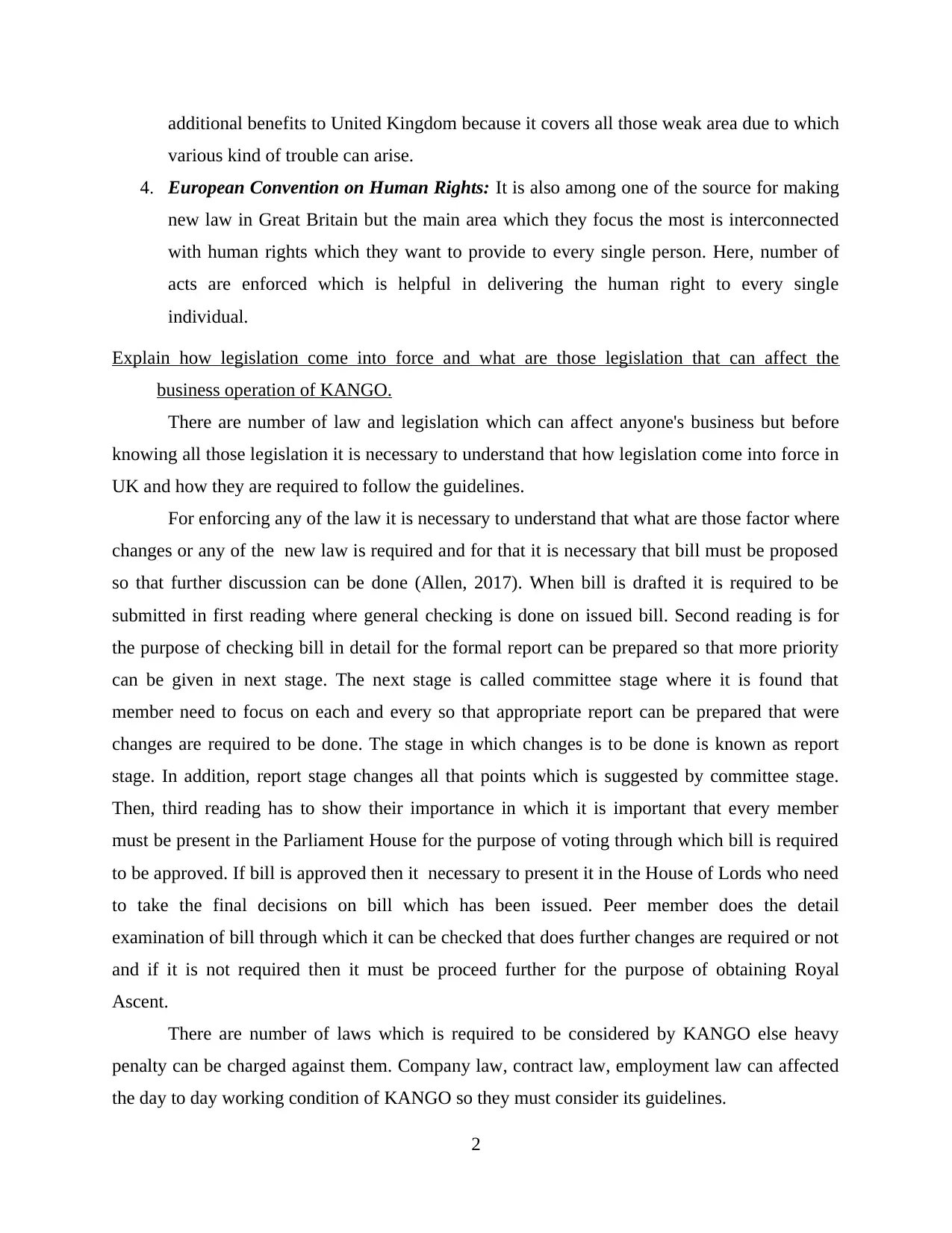
additional benefits to United Kingdom because it covers all those weak area due to which
various kind of trouble can arise.
4. European Convention on Human Rights: It is also among one of the source for making
new law in Great Britain but the main area which they focus the most is interconnected
with human rights which they want to provide to every single person. Here, number of
acts are enforced which is helpful in delivering the human right to every single
individual.
Explain how legislation come into force and what are those legislation that can affect the
business operation of KANGO.
There are number of law and legislation which can affect anyone's business but before
knowing all those legislation it is necessary to understand that how legislation come into force in
UK and how they are required to follow the guidelines.
For enforcing any of the law it is necessary to understand that what are those factor where
changes or any of the new law is required and for that it is necessary that bill must be proposed
so that further discussion can be done (Allen, 2017). When bill is drafted it is required to be
submitted in first reading where general checking is done on issued bill. Second reading is for
the purpose of checking bill in detail for the formal report can be prepared so that more priority
can be given in next stage. The next stage is called committee stage where it is found that
member need to focus on each and every so that appropriate report can be prepared that were
changes are required to be done. The stage in which changes is to be done is known as report
stage. In addition, report stage changes all that points which is suggested by committee stage.
Then, third reading has to show their importance in which it is important that every member
must be present in the Parliament House for the purpose of voting through which bill is required
to be approved. If bill is approved then it necessary to present it in the House of Lords who need
to take the final decisions on bill which has been issued. Peer member does the detail
examination of bill through which it can be checked that does further changes are required or not
and if it is not required then it must be proceed further for the purpose of obtaining Royal
Ascent.
There are number of laws which is required to be considered by KANGO else heavy
penalty can be charged against them. Company law, contract law, employment law can affected
the day to day working condition of KANGO so they must consider its guidelines.
2
various kind of trouble can arise.
4. European Convention on Human Rights: It is also among one of the source for making
new law in Great Britain but the main area which they focus the most is interconnected
with human rights which they want to provide to every single person. Here, number of
acts are enforced which is helpful in delivering the human right to every single
individual.
Explain how legislation come into force and what are those legislation that can affect the
business operation of KANGO.
There are number of law and legislation which can affect anyone's business but before
knowing all those legislation it is necessary to understand that how legislation come into force in
UK and how they are required to follow the guidelines.
For enforcing any of the law it is necessary to understand that what are those factor where
changes or any of the new law is required and for that it is necessary that bill must be proposed
so that further discussion can be done (Allen, 2017). When bill is drafted it is required to be
submitted in first reading where general checking is done on issued bill. Second reading is for
the purpose of checking bill in detail for the formal report can be prepared so that more priority
can be given in next stage. The next stage is called committee stage where it is found that
member need to focus on each and every so that appropriate report can be prepared that were
changes are required to be done. The stage in which changes is to be done is known as report
stage. In addition, report stage changes all that points which is suggested by committee stage.
Then, third reading has to show their importance in which it is important that every member
must be present in the Parliament House for the purpose of voting through which bill is required
to be approved. If bill is approved then it necessary to present it in the House of Lords who need
to take the final decisions on bill which has been issued. Peer member does the detail
examination of bill through which it can be checked that does further changes are required or not
and if it is not required then it must be proceed further for the purpose of obtaining Royal
Ascent.
There are number of laws which is required to be considered by KANGO else heavy
penalty can be charged against them. Company law, contract law, employment law can affected
the day to day working condition of KANGO so they must consider its guidelines.
2
Paraphrase This Document
Need a fresh take? Get an instant paraphrase of this document with our AI Paraphraser
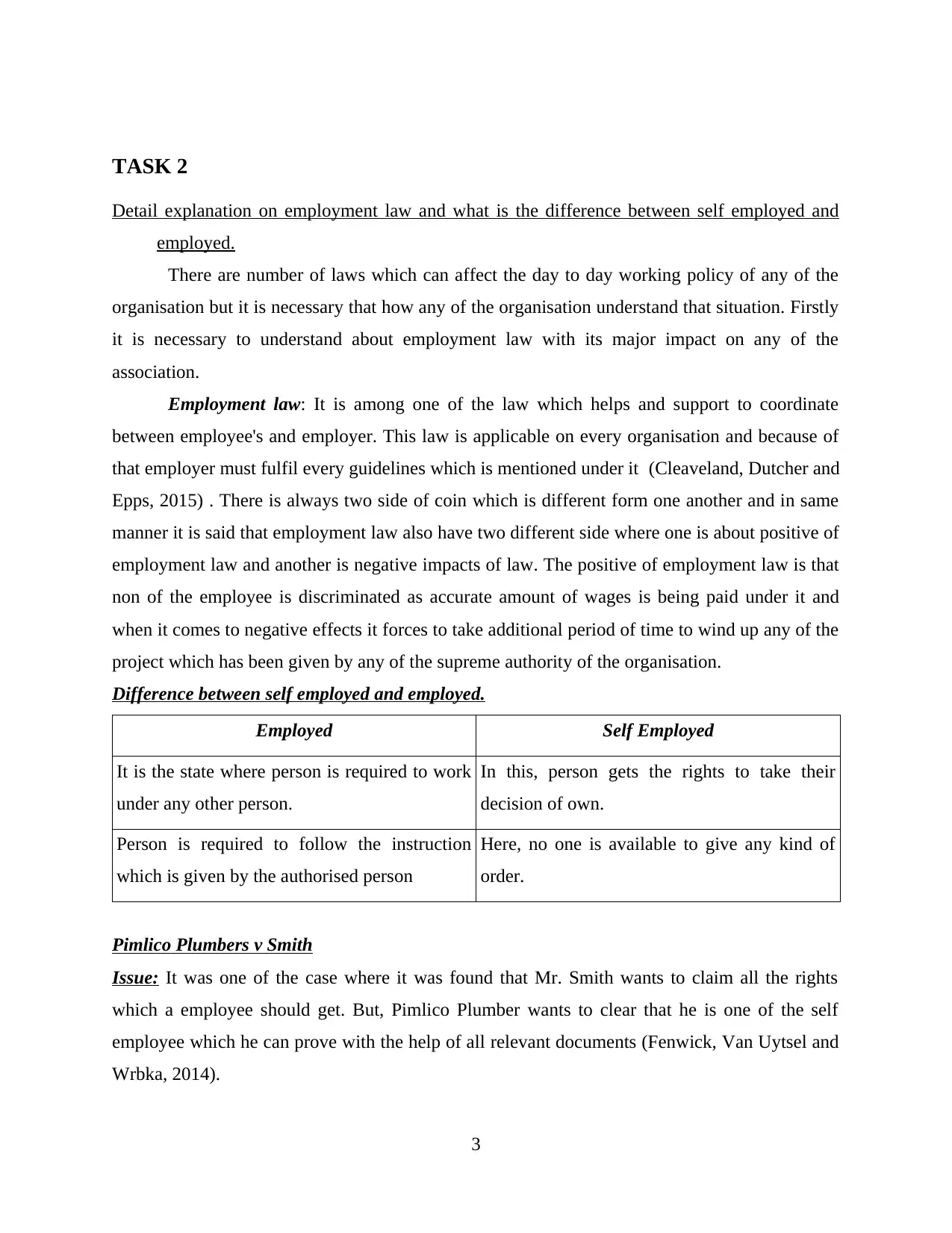
TASK 2
Detail explanation on employment law and what is the difference between self employed and
employed.
There are number of laws which can affect the day to day working policy of any of the
organisation but it is necessary that how any of the organisation understand that situation. Firstly
it is necessary to understand about employment law with its major impact on any of the
association.
Employment law: It is among one of the law which helps and support to coordinate
between employee's and employer. This law is applicable on every organisation and because of
that employer must fulfil every guidelines which is mentioned under it (Cleaveland, Dutcher and
Epps, 2015) . There is always two side of coin which is different form one another and in same
manner it is said that employment law also have two different side where one is about positive of
employment law and another is negative impacts of law. The positive of employment law is that
non of the employee is discriminated as accurate amount of wages is being paid under it and
when it comes to negative effects it forces to take additional period of time to wind up any of the
project which has been given by any of the supreme authority of the organisation.
Difference between self employed and employed.
Employed Self Employed
It is the state where person is required to work
under any other person.
In this, person gets the rights to take their
decision of own.
Person is required to follow the instruction
which is given by the authorised person
Here, no one is available to give any kind of
order.
Pimlico Plumbers v Smith
Issue: It was one of the case where it was found that Mr. Smith wants to claim all the rights
which a employee should get. But, Pimlico Plumber wants to clear that he is one of the self
employee which he can prove with the help of all relevant documents (Fenwick, Van Uytsel and
Wrbka, 2014).
3
Detail explanation on employment law and what is the difference between self employed and
employed.
There are number of laws which can affect the day to day working policy of any of the
organisation but it is necessary that how any of the organisation understand that situation. Firstly
it is necessary to understand about employment law with its major impact on any of the
association.
Employment law: It is among one of the law which helps and support to coordinate
between employee's and employer. This law is applicable on every organisation and because of
that employer must fulfil every guidelines which is mentioned under it (Cleaveland, Dutcher and
Epps, 2015) . There is always two side of coin which is different form one another and in same
manner it is said that employment law also have two different side where one is about positive of
employment law and another is negative impacts of law. The positive of employment law is that
non of the employee is discriminated as accurate amount of wages is being paid under it and
when it comes to negative effects it forces to take additional period of time to wind up any of the
project which has been given by any of the supreme authority of the organisation.
Difference between self employed and employed.
Employed Self Employed
It is the state where person is required to work
under any other person.
In this, person gets the rights to take their
decision of own.
Person is required to follow the instruction
which is given by the authorised person
Here, no one is available to give any kind of
order.
Pimlico Plumbers v Smith
Issue: It was one of the case where it was found that Mr. Smith wants to claim all the rights
which a employee should get. But, Pimlico Plumber wants to clear that he is one of the self
employee which he can prove with the help of all relevant documents (Fenwick, Van Uytsel and
Wrbka, 2014).
3
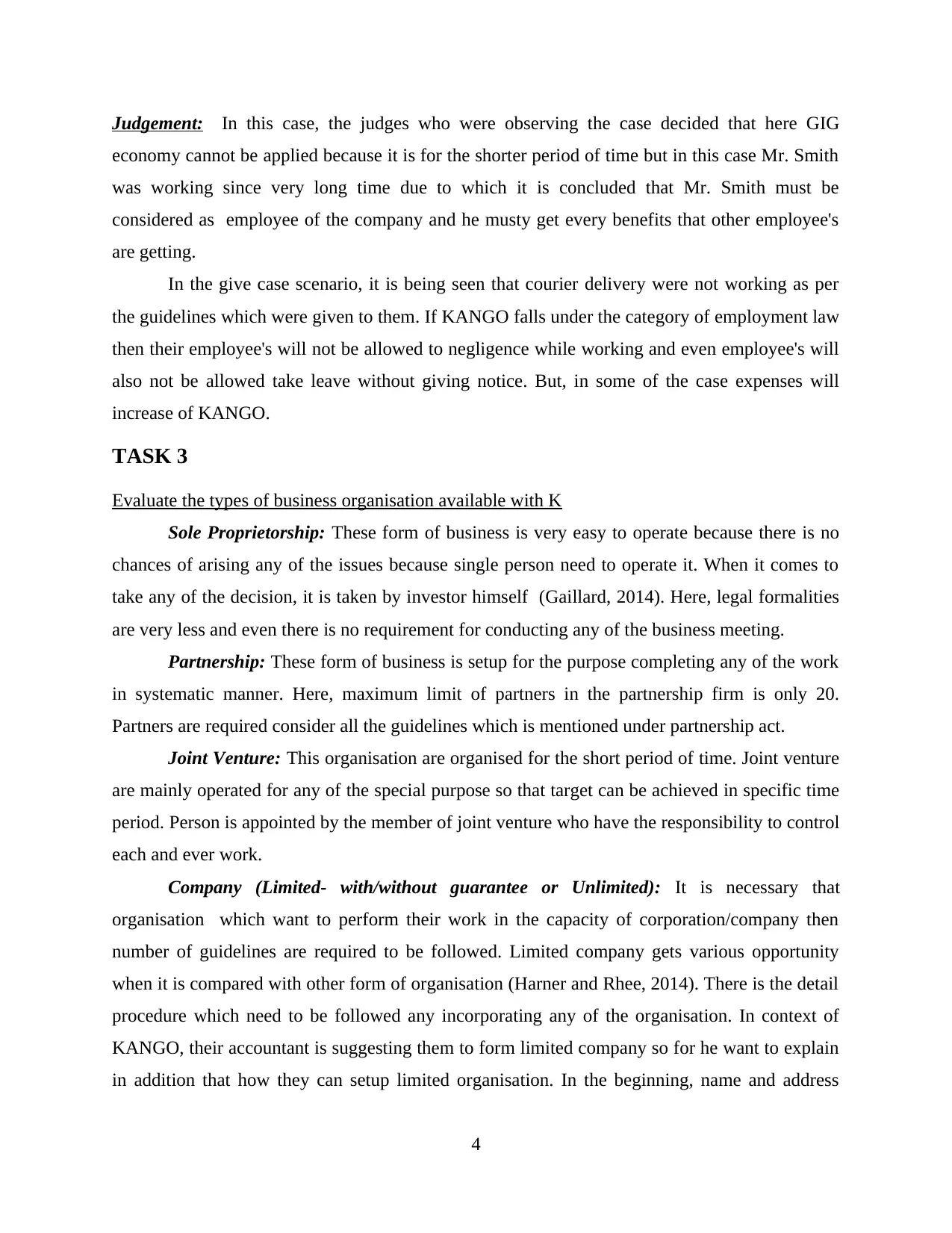
Judgement: In this case, the judges who were observing the case decided that here GIG
economy cannot be applied because it is for the shorter period of time but in this case Mr. Smith
was working since very long time due to which it is concluded that Mr. Smith must be
considered as employee of the company and he musty get every benefits that other employee's
are getting.
In the give case scenario, it is being seen that courier delivery were not working as per
the guidelines which were given to them. If KANGO falls under the category of employment law
then their employee's will not be allowed to negligence while working and even employee's will
also not be allowed take leave without giving notice. But, in some of the case expenses will
increase of KANGO.
TASK 3
Evaluate the types of business organisation available with K
Sole Proprietorship: These form of business is very easy to operate because there is no
chances of arising any of the issues because single person need to operate it. When it comes to
take any of the decision, it is taken by investor himself (Gaillard, 2014). Here, legal formalities
are very less and even there is no requirement for conducting any of the business meeting.
Partnership: These form of business is setup for the purpose completing any of the work
in systematic manner. Here, maximum limit of partners in the partnership firm is only 20.
Partners are required consider all the guidelines which is mentioned under partnership act.
Joint Venture: This organisation are organised for the short period of time. Joint venture
are mainly operated for any of the special purpose so that target can be achieved in specific time
period. Person is appointed by the member of joint venture who have the responsibility to control
each and ever work.
Company (Limited- with/without guarantee or Unlimited): It is necessary that
organisation which want to perform their work in the capacity of corporation/company then
number of guidelines are required to be followed. Limited company gets various opportunity
when it is compared with other form of organisation (Harner and Rhee, 2014). There is the detail
procedure which need to be followed any incorporating any of the organisation. In context of
KANGO, their accountant is suggesting them to form limited company so for he want to explain
in addition that how they can setup limited organisation. In the beginning, name and address
4
economy cannot be applied because it is for the shorter period of time but in this case Mr. Smith
was working since very long time due to which it is concluded that Mr. Smith must be
considered as employee of the company and he musty get every benefits that other employee's
are getting.
In the give case scenario, it is being seen that courier delivery were not working as per
the guidelines which were given to them. If KANGO falls under the category of employment law
then their employee's will not be allowed to negligence while working and even employee's will
also not be allowed take leave without giving notice. But, in some of the case expenses will
increase of KANGO.
TASK 3
Evaluate the types of business organisation available with K
Sole Proprietorship: These form of business is very easy to operate because there is no
chances of arising any of the issues because single person need to operate it. When it comes to
take any of the decision, it is taken by investor himself (Gaillard, 2014). Here, legal formalities
are very less and even there is no requirement for conducting any of the business meeting.
Partnership: These form of business is setup for the purpose completing any of the work
in systematic manner. Here, maximum limit of partners in the partnership firm is only 20.
Partners are required consider all the guidelines which is mentioned under partnership act.
Joint Venture: This organisation are organised for the short period of time. Joint venture
are mainly operated for any of the special purpose so that target can be achieved in specific time
period. Person is appointed by the member of joint venture who have the responsibility to control
each and ever work.
Company (Limited- with/without guarantee or Unlimited): It is necessary that
organisation which want to perform their work in the capacity of corporation/company then
number of guidelines are required to be followed. Limited company gets various opportunity
when it is compared with other form of organisation (Harner and Rhee, 2014). There is the detail
procedure which need to be followed any incorporating any of the organisation. In context of
KANGO, their accountant is suggesting them to form limited company so for he want to explain
in addition that how they can setup limited organisation. In the beginning, name and address
4
⊘ This is a preview!⊘
Do you want full access?
Subscribe today to unlock all pages.

Trusted by 1+ million students worldwide
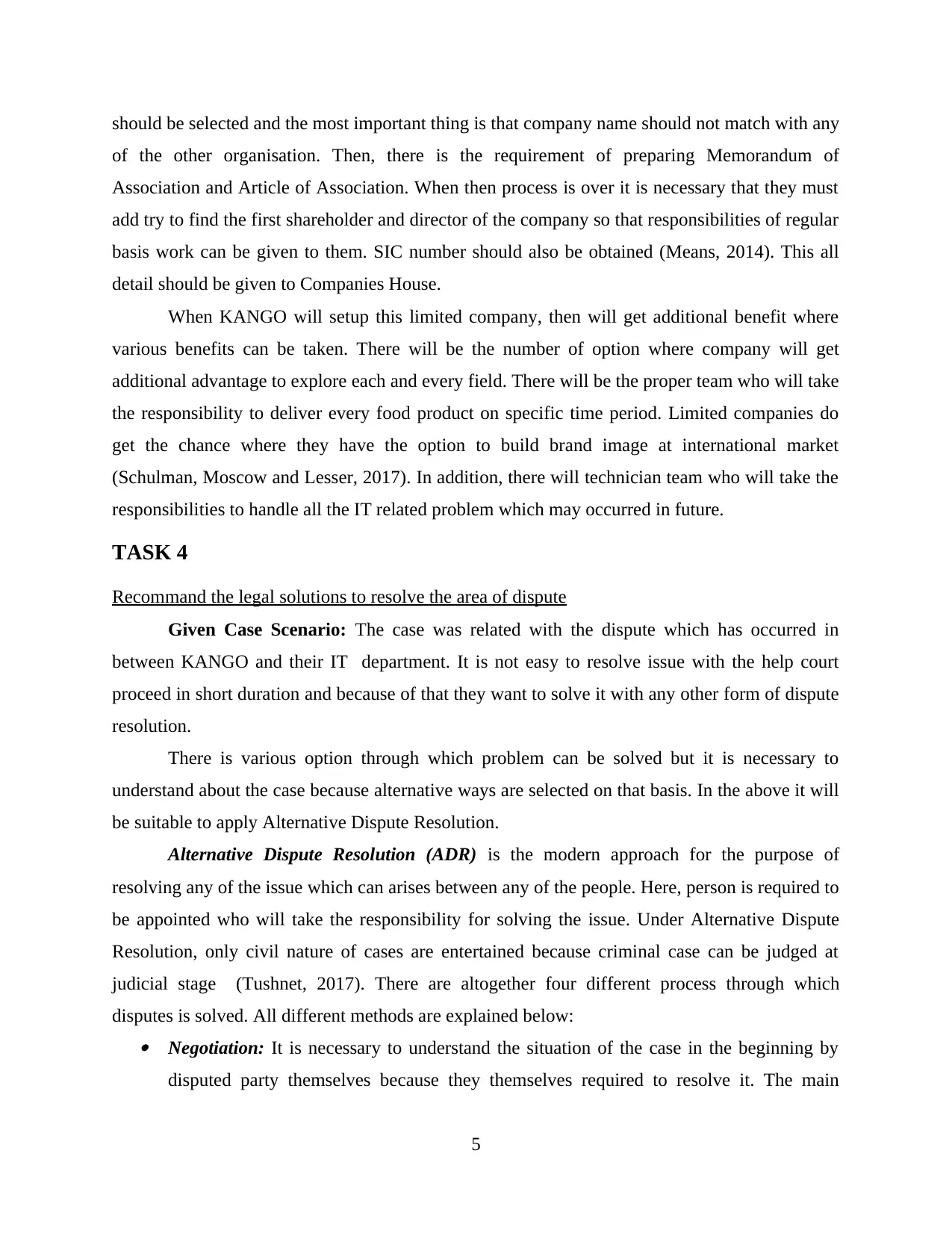
should be selected and the most important thing is that company name should not match with any
of the other organisation. Then, there is the requirement of preparing Memorandum of
Association and Article of Association. When then process is over it is necessary that they must
add try to find the first shareholder and director of the company so that responsibilities of regular
basis work can be given to them. SIC number should also be obtained (Means, 2014). This all
detail should be given to Companies House.
When KANGO will setup this limited company, then will get additional benefit where
various benefits can be taken. There will be the number of option where company will get
additional advantage to explore each and every field. There will be the proper team who will take
the responsibility to deliver every food product on specific time period. Limited companies do
get the chance where they have the option to build brand image at international market
(Schulman, Moscow and Lesser, 2017). In addition, there will technician team who will take the
responsibilities to handle all the IT related problem which may occurred in future.
TASK 4
Recommand the legal solutions to resolve the area of dispute
Given Case Scenario: The case was related with the dispute which has occurred in
between KANGO and their IT department. It is not easy to resolve issue with the help court
proceed in short duration and because of that they want to solve it with any other form of dispute
resolution.
There is various option through which problem can be solved but it is necessary to
understand about the case because alternative ways are selected on that basis. In the above it will
be suitable to apply Alternative Dispute Resolution.
Alternative Dispute Resolution (ADR) is the modern approach for the purpose of
resolving any of the issue which can arises between any of the people. Here, person is required to
be appointed who will take the responsibility for solving the issue. Under Alternative Dispute
Resolution, only civil nature of cases are entertained because criminal case can be judged at
judicial stage (Tushnet, 2017). There are altogether four different process through which
disputes is solved. All different methods are explained below: Negotiation: It is necessary to understand the situation of the case in the beginning by
disputed party themselves because they themselves required to resolve it. The main
5
of the other organisation. Then, there is the requirement of preparing Memorandum of
Association and Article of Association. When then process is over it is necessary that they must
add try to find the first shareholder and director of the company so that responsibilities of regular
basis work can be given to them. SIC number should also be obtained (Means, 2014). This all
detail should be given to Companies House.
When KANGO will setup this limited company, then will get additional benefit where
various benefits can be taken. There will be the number of option where company will get
additional advantage to explore each and every field. There will be the proper team who will take
the responsibility to deliver every food product on specific time period. Limited companies do
get the chance where they have the option to build brand image at international market
(Schulman, Moscow and Lesser, 2017). In addition, there will technician team who will take the
responsibilities to handle all the IT related problem which may occurred in future.
TASK 4
Recommand the legal solutions to resolve the area of dispute
Given Case Scenario: The case was related with the dispute which has occurred in
between KANGO and their IT department. It is not easy to resolve issue with the help court
proceed in short duration and because of that they want to solve it with any other form of dispute
resolution.
There is various option through which problem can be solved but it is necessary to
understand about the case because alternative ways are selected on that basis. In the above it will
be suitable to apply Alternative Dispute Resolution.
Alternative Dispute Resolution (ADR) is the modern approach for the purpose of
resolving any of the issue which can arises between any of the people. Here, person is required to
be appointed who will take the responsibility for solving the issue. Under Alternative Dispute
Resolution, only civil nature of cases are entertained because criminal case can be judged at
judicial stage (Tushnet, 2017). There are altogether four different process through which
disputes is solved. All different methods are explained below: Negotiation: It is necessary to understand the situation of the case in the beginning by
disputed party themselves because they themselves required to resolve it. The main
5
Paraphrase This Document
Need a fresh take? Get an instant paraphrase of this document with our AI Paraphraser
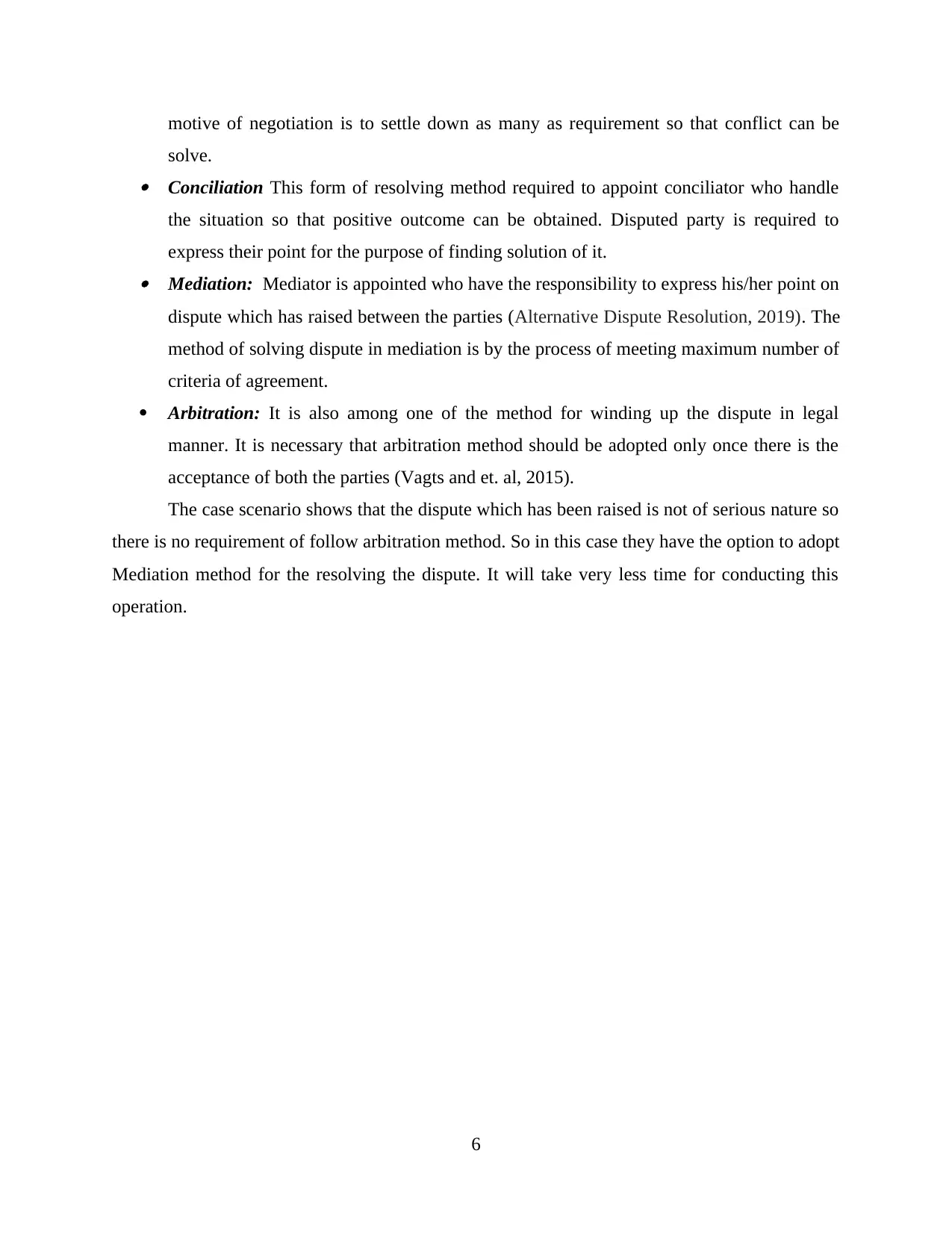
motive of negotiation is to settle down as many as requirement so that conflict can be
solve. Conciliation This form of resolving method required to appoint conciliator who handle
the situation so that positive outcome can be obtained. Disputed party is required to
express their point for the purpose of finding solution of it. Mediation: Mediator is appointed who have the responsibility to express his/her point on
dispute which has raised between the parties (Alternative Dispute Resolution, 2019). The
method of solving dispute in mediation is by the process of meeting maximum number of
criteria of agreement.
Arbitration: It is also among one of the method for winding up the dispute in legal
manner. It is necessary that arbitration method should be adopted only once there is the
acceptance of both the parties (Vagts and et. al, 2015).
The case scenario shows that the dispute which has been raised is not of serious nature so
there is no requirement of follow arbitration method. So in this case they have the option to adopt
Mediation method for the resolving the dispute. It will take very less time for conducting this
operation.
6
solve. Conciliation This form of resolving method required to appoint conciliator who handle
the situation so that positive outcome can be obtained. Disputed party is required to
express their point for the purpose of finding solution of it. Mediation: Mediator is appointed who have the responsibility to express his/her point on
dispute which has raised between the parties (Alternative Dispute Resolution, 2019). The
method of solving dispute in mediation is by the process of meeting maximum number of
criteria of agreement.
Arbitration: It is also among one of the method for winding up the dispute in legal
manner. It is necessary that arbitration method should be adopted only once there is the
acceptance of both the parties (Vagts and et. al, 2015).
The case scenario shows that the dispute which has been raised is not of serious nature so
there is no requirement of follow arbitration method. So in this case they have the option to adopt
Mediation method for the resolving the dispute. It will take very less time for conducting this
operation.
6
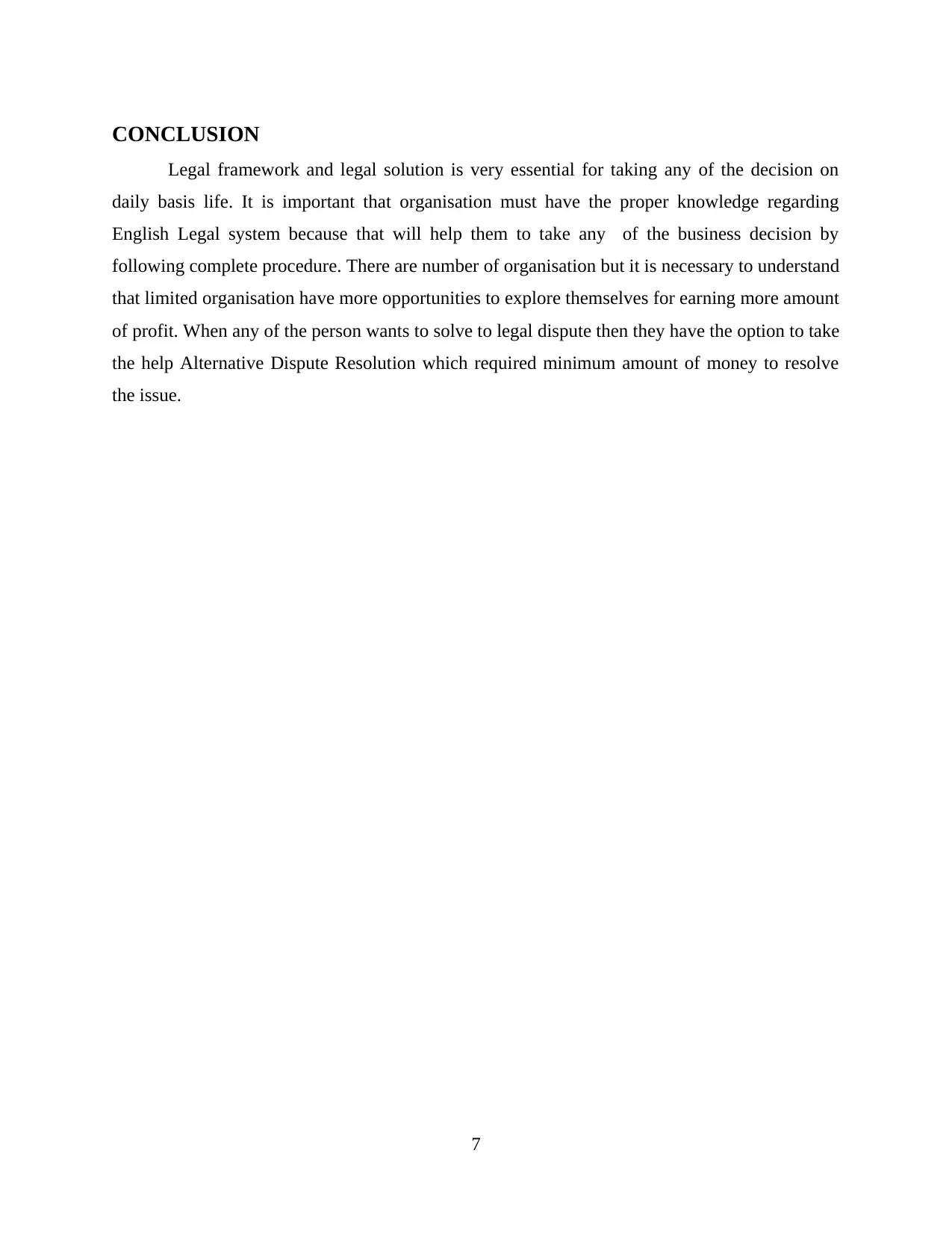
CONCLUSION
Legal framework and legal solution is very essential for taking any of the decision on
daily basis life. It is important that organisation must have the proper knowledge regarding
English Legal system because that will help them to take any of the business decision by
following complete procedure. There are number of organisation but it is necessary to understand
that limited organisation have more opportunities to explore themselves for earning more amount
of profit. When any of the person wants to solve to legal dispute then they have the option to take
the help Alternative Dispute Resolution which required minimum amount of money to resolve
the issue.
7
Legal framework and legal solution is very essential for taking any of the decision on
daily basis life. It is important that organisation must have the proper knowledge regarding
English Legal system because that will help them to take any of the business decision by
following complete procedure. There are number of organisation but it is necessary to understand
that limited organisation have more opportunities to explore themselves for earning more amount
of profit. When any of the person wants to solve to legal dispute then they have the option to take
the help Alternative Dispute Resolution which required minimum amount of money to resolve
the issue.
7
⊘ This is a preview!⊘
Do you want full access?
Subscribe today to unlock all pages.

Trusted by 1+ million students worldwide
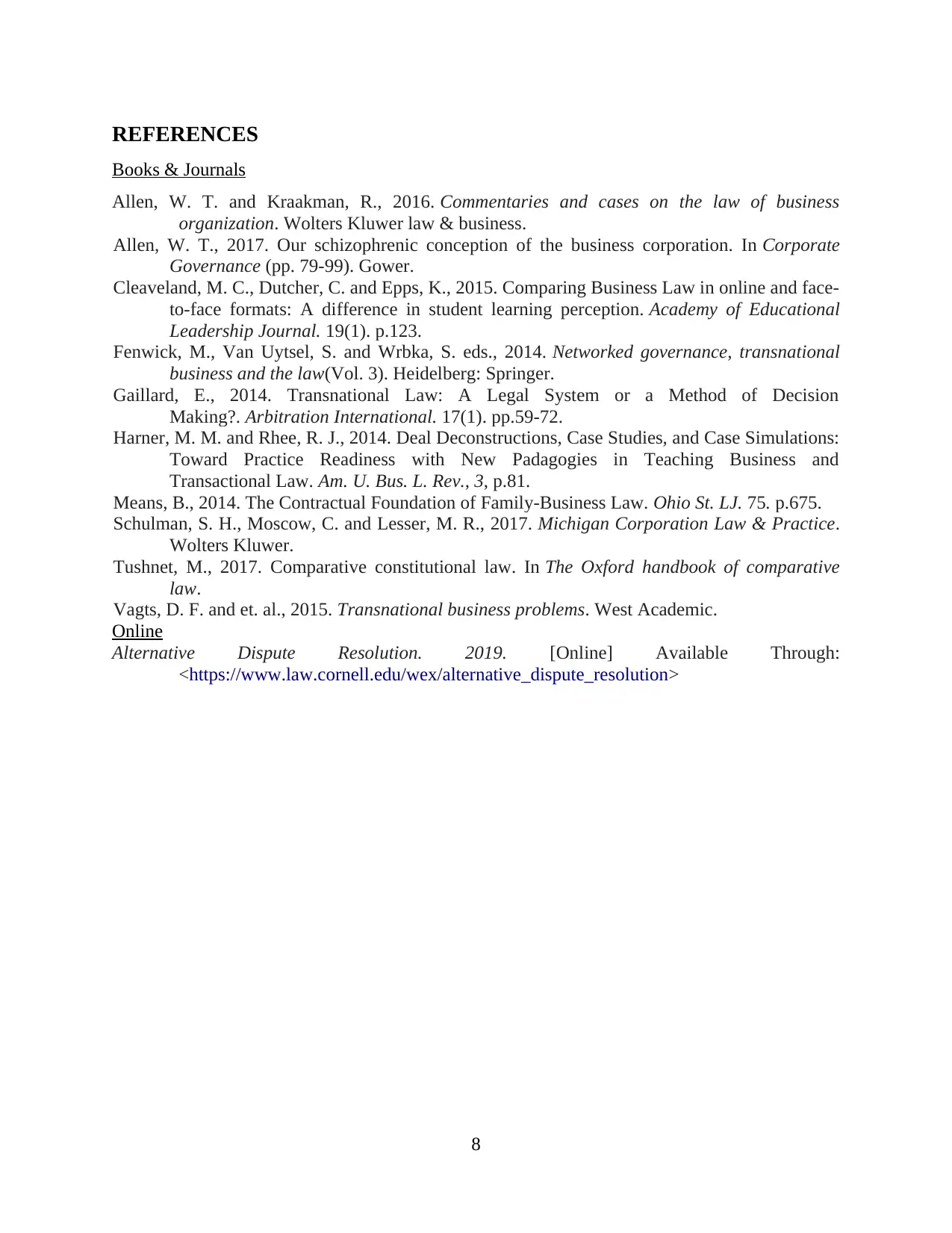
REFERENCES
Books & Journals
Allen, W. T. and Kraakman, R., 2016. Commentaries and cases on the law of business
organization. Wolters Kluwer law & business.
Allen, W. T., 2017. Our schizophrenic conception of the business corporation. In Corporate
Governance (pp. 79-99). Gower.
Cleaveland, M. C., Dutcher, C. and Epps, K., 2015. Comparing Business Law in online and face-
to-face formats: A difference in student learning perception. Academy of Educational
Leadership Journal. 19(1). p.123.
Fenwick, M., Van Uytsel, S. and Wrbka, S. eds., 2014. Networked governance, transnational
business and the law(Vol. 3). Heidelberg: Springer.
Gaillard, E., 2014. Transnational Law: A Legal System or a Method of Decision
Making?. Arbitration International. 17(1). pp.59-72.
Harner, M. M. and Rhee, R. J., 2014. Deal Deconstructions, Case Studies, and Case Simulations:
Toward Practice Readiness with New Padagogies in Teaching Business and
Transactional Law. Am. U. Bus. L. Rev., 3, p.81.
Means, B., 2014. The Contractual Foundation of Family-Business Law. Ohio St. LJ. 75. p.675.
Schulman, S. H., Moscow, C. and Lesser, M. R., 2017. Michigan Corporation Law & Practice.
Wolters Kluwer.
Tushnet, M., 2017. Comparative constitutional law. In The Oxford handbook of comparative
law.
Vagts, D. F. and et. al., 2015. Transnational business problems. West Academic.
Online
Alternative Dispute Resolution. 2019. [Online] Available Through:
<https://www.law.cornell.edu/wex/alternative_dispute_resolution>
8
Books & Journals
Allen, W. T. and Kraakman, R., 2016. Commentaries and cases on the law of business
organization. Wolters Kluwer law & business.
Allen, W. T., 2017. Our schizophrenic conception of the business corporation. In Corporate
Governance (pp. 79-99). Gower.
Cleaveland, M. C., Dutcher, C. and Epps, K., 2015. Comparing Business Law in online and face-
to-face formats: A difference in student learning perception. Academy of Educational
Leadership Journal. 19(1). p.123.
Fenwick, M., Van Uytsel, S. and Wrbka, S. eds., 2014. Networked governance, transnational
business and the law(Vol. 3). Heidelberg: Springer.
Gaillard, E., 2014. Transnational Law: A Legal System or a Method of Decision
Making?. Arbitration International. 17(1). pp.59-72.
Harner, M. M. and Rhee, R. J., 2014. Deal Deconstructions, Case Studies, and Case Simulations:
Toward Practice Readiness with New Padagogies in Teaching Business and
Transactional Law. Am. U. Bus. L. Rev., 3, p.81.
Means, B., 2014. The Contractual Foundation of Family-Business Law. Ohio St. LJ. 75. p.675.
Schulman, S. H., Moscow, C. and Lesser, M. R., 2017. Michigan Corporation Law & Practice.
Wolters Kluwer.
Tushnet, M., 2017. Comparative constitutional law. In The Oxford handbook of comparative
law.
Vagts, D. F. and et. al., 2015. Transnational business problems. West Academic.
Online
Alternative Dispute Resolution. 2019. [Online] Available Through:
<https://www.law.cornell.edu/wex/alternative_dispute_resolution>
8
1 out of 10
Related Documents
Your All-in-One AI-Powered Toolkit for Academic Success.
+13062052269
info@desklib.com
Available 24*7 on WhatsApp / Email
![[object Object]](/_next/static/media/star-bottom.7253800d.svg)
Unlock your academic potential
Copyright © 2020–2025 A2Z Services. All Rights Reserved. Developed and managed by ZUCOL.





